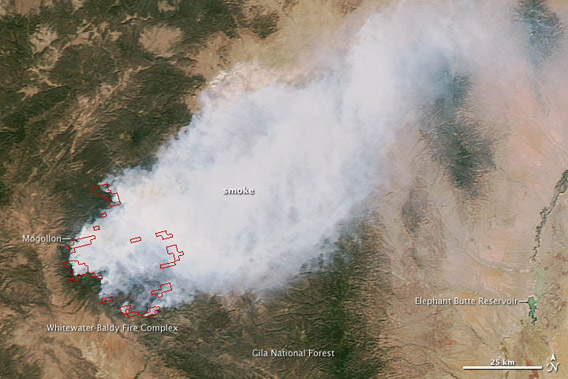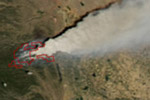
New Mexico’s biggest fire ever as seen on May 29th from NASA’s Aqua satellite. Photo by: NASA.
Spring in the U.S. was the warmest on record, beating the past record-year (1910), by a stunning two degrees Fahrenheit, according to new data from the National Oceanic and Atmospheric Administration (NOAA). The data also shows that the past 12 months—from June 2011 through May 2012—was the warmest on record in the contiguous U.S. as well.
According to NOAA, March 2012 was the warmest ever, April the third warmest, and May the second warmest. May was 3.3 degrees Fahrenheit above average in the contiguous U.S.
Warm temperatures and ongoing drought conditions in the Southwest U.S. have fueled recent wildfires in New Mexico and Colorado. In fact, New Mexico has seen its largest wildfire ever with 247,000 acres (100,000 hectares) burned in the Gila Forest, beating out its previous record made just last year.
Since the early Twentieth Century, temperatures have risen by 0.8 degrees Celsius (1.44 degrees Fahrenheit) worldwide due to anthropogenic climate change.
Related articles
As Colorado and New Mexico burn, scientists say prepare for more

(06/12/2012) A massive wildlife in Colorado still burns after it has killed one person and damaged or destroyed over a hundred structures. The fire, the third largest in Colorado’s history, has burned 39,500 acres (16,000 hectares) to date. Meanwhile in central New Mexico, another wildfire has damaged or destroyed 35 structures and burned 34,500 acres (14,000 hectares). This comes just weeks after New Mexico’s largest wildfire ever—still going—burned up over 247,000 acres (100,000 hectares) of the Gila Forest. Weeks of heroic efforts by thousands of firefighters have contained this megafire by only 37 percent to date. Now, a new scientific study in Ecospshere has found that North America and Europe must prepare for even more fires as global temperatures continue to rise from climate change.
As La Nina ends, world experiences 5th warmest April
(05/21/2012) La Nina conditions, which generally bring colder temperatures to many parts of the world, ended last month resulting in the fifth warmest April since record-keeping began, and the hottest April yet in the terrestrial Northern Hemisphere, according to the National Oceanic and Atmospheric Administration (NOAA).
U.S. undergoes warmest 12 months yet
(05/10/2012) Americans would not be remiss in asking, “is it getting hot in here?” According to new data from the National Oceanic and Atmospheric Administration (NOAA)’s National Climatic Data Center, the last twelve months (from May 2011 through April 2012) were the warmest on record for the lower 48 U.S. states since record keeping began in the late 19th Century.
U.S. suffers warmest March, breaking over 15,000 record temperatures
(04/11/2012) March was the warmest ever recorded in the U.S. with record-keeping going back to 1895, according to new data by the National Oceanic and Atmospheric Administration (NOAA). But the month wasn’t just a record-breaker, it was shockingly aberrant: an extreme heatwave throughout much of the eastern and central U.S. shattered 15,272 day and nighttime records across the U.S. In all March 2012 was 0.5 degrees Fahrenheit above the previous warmest March in 1910, and an astounding 8.6 degrees Fahrenheit above the 20th Century average for March in the U.S.
Oceans heating up for over 100 years
(04/02/2012) In 1872 the HMS Challenger pulled out from Portsmouth, England to begin an unprecedented scientific expedition of the world’s oceans. During its over three year journey the HMS Challenger not only collected thousands of new species and sounded unknown ocean depths, but also took hundreds of temperature readings—data which is now proving invaluable to our understanding of climate change.
“Strong evidence” linking extreme heatwaves, floods, and droughts to climate change
(03/28/2012) As North America recovers from what noted meteorologist Jeff Masters has called “the most incredible spring heatwave in U.S. and Canadian recorded history,” a new paper argues that climate change is playing an important role in a world that appears increasingly pummeled by extreme weather. Published in Nature Climate Change, the paper surveys recent studies of climate change and extreme weather and finds “strong evidence” of a link between a warming world and the frequency and intensity of droughts, floods, and heatwaves—such as the one that turned winter into summer in the U.S.